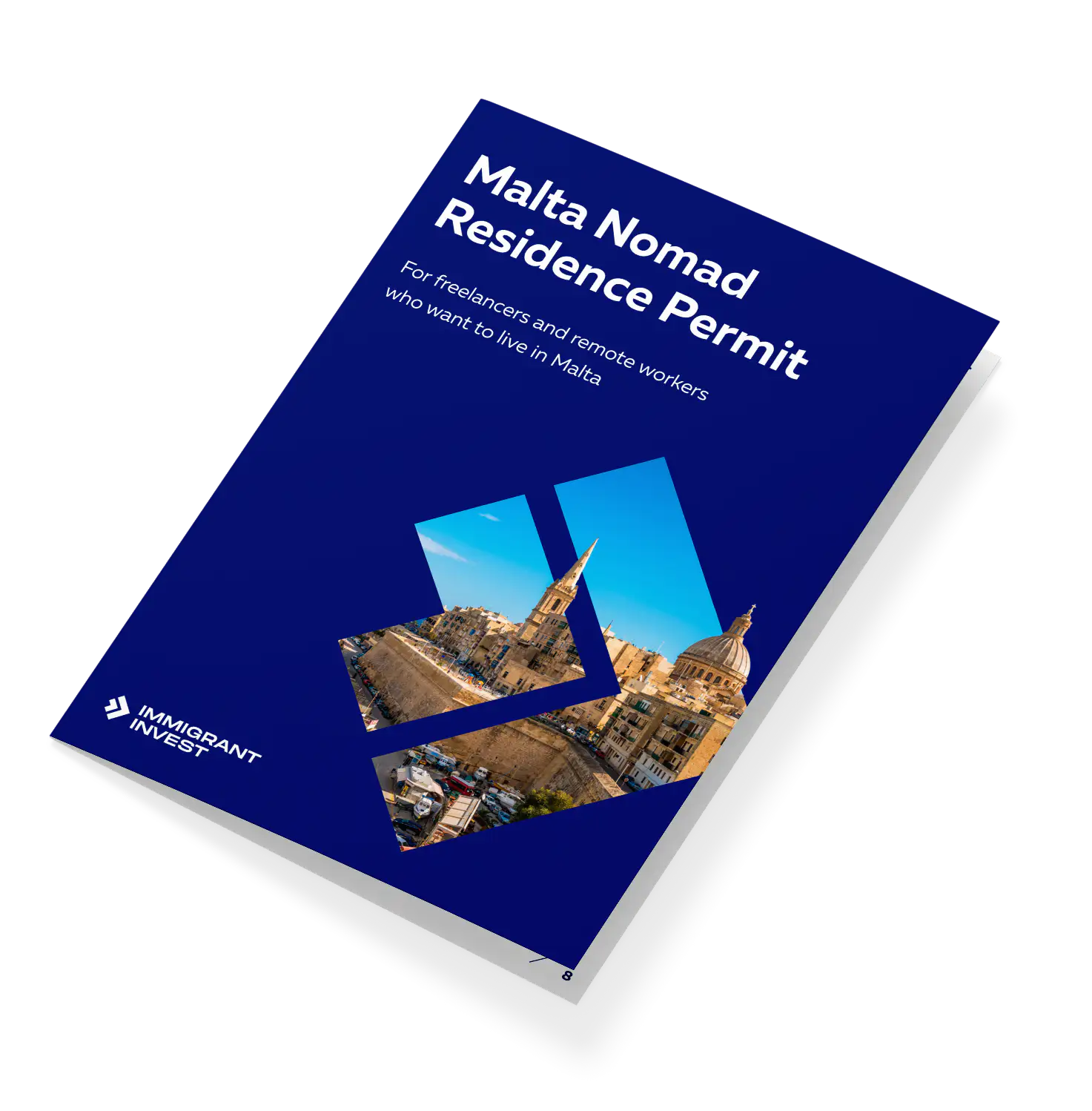
Malta Nomad Residence
Residency in Malta for living and working by the side of the Mediterranean Sea
The Malta Nomad Residence Permit allows foreigners to relocate to the country while keeping their current place of employment. The status is granted to digital nomads whose jobs do not depend on location and can be done remotely via the Internet.
The residence permit allows digital nomads to stay in Malta for up to 4 years. The initial status is granted for 12 months, with the opportunity to extend it thrice for the same period.
The Nomad Residence Permit is granted to freelancers, employees and managers of foreign companies, and self-employed. The main applicant can add their spouse and children to the application.
Eligibility requirements include proving income of at least €42,000 per annum outside Malta and renting or buying residential property on the island for the entire permit validity period.
9 benefits of the Malta Digital Nomad Visa
As Malta is a Schengen member state, Nomad Residence Permit holders are allowed to freely travel to 26 other Schengen countries and stay there for up to 90 days out of 180.
Malta is one of the most affordable EU countries to live in. The cost of living index in the country is 50% lower than in Switzerland, 30% lower than in Norway, 16% lower than in France, and 12% lower than in Germany, according to Numbeo.com.
Compared to the US, the cost of living in Malta is almost 25% lower.
Digital nomads residing in Malta are subject to a flat 10% income tax, whereas other Maltese residents are taxed on their global income at progressive rates of up to 35%. Additionally, digital nomads are exempt from this 10% tax for their first 12 months in Malta.
A high-quality Internet connection is a must for digital nomads. Malta features a nationwide 5G mobile connection that allows digital nomads to explore the island while always being online.
Malta is ranked 21st in the world for Wi-Fi speed, with an average value of 85.20 Mbps. Digital nomads can find public Wi-Fi in big cities such as Sliema and Valletta.
Maltese cities traditionally popular with expats, such as Sliema, Valletta, Gzira, Mosta, and St. Julian’s, offer plenty of coworking spaces. Digital nomads can purchase daily or monthly membership passes and even monthly packages for a dedicated desk or a private office.
Along with the Maltese, English is one of the official languages in Malta. This means that everyday communications will be easier and more convenient for expats, allowing them to solve day-to-day tasks smoothly and meet new people.
Digital nomads wishing to discover the island will benefit from an extensive bus network and ferry routes that allow visiting virtually every corner of the country.
In Malta, everyone can find a perfect lifestyle for themself. Digital nomads looking for an active life with plenty of events and social activities can settle in Sliema, Valletta, or St. Julian’s. Those dreaming of a tranquil life can go to a more rural area of Gozo.
Malta has over 300 sunny days per year, with an average air temperature of 28—32°C in the summer and 15—17°C in the winter, which makes the country an ideal place for life and travel.

Practical guide to the Malta Nomad Residence
- Step-by-step procedure
- Requirements for applicants
- Required documents
- Answers to frequently asked questions
Who can apply for Maltese Nomad Residence
- Over 18
- Non-EU and non-EEA citizen
- Working remotely for an employer registered outside Malta, conducting business activities for a non-Maltese company, or offering freelance services to clients outside Malta
- Earning income of at least €42,000 per year
- Owning or renting residential property in Malta
- In an official marriage or partnership with the main applicant
- Including same-sex couples
Including those of a spouse
- Including those of a spouse
- Not married
- Principally dependent on the main applicant
Malta Digital Nomad Visa costs
Costs for obtaining the Malta Nomad Residence include the purchase or rental of real estate, health insurance premiums, and administrative fees such as an application processing fee and a residence card issuance fee.
The Maltese authorities do not specify minimum real estate rental or purchase prices, so applicants can choose any property they like. Property rental depends on the location and the number of rooms. An average cost is about €1,000—1,500 per month.
| Expense | A single applicant | A family of 4 |
| Property costs | No specific requirements for property purchase or rental price €765+ per month for rental of a 1-bedroom apartment | No specific requirements for property purchase or rental price €1,200+ per month for rental of a 3-bedroom apartment |
| Travel insurance | €14+ per month | €56+ per month |
| Application fee | €300 | €1,200 |
| Residence card issuance fee | €27.5 | €110 |
| Medical insurance | €50+ | €200+ |

Individual cost calculation for the Malta Nomad Residence
Get an individual calculation for your family with all associated costs and government fees
Get the cost calculationRequired documents to obtain Malta Nomad Residence
A Malta Digital Nomad Visa application should be accompanied by the following pack of documents:
- filled-in forms for the main applicant and dependants;
- copy of all pages of an international passports;
- letter of intent explaining the reason for obtaining a residence permit and moving to Malta;
- documents confirming remote employment;
- CV;
- bank statements proving an income of at least €42,000 per annum;
- marriage certificate, if applicable;
- birth certificates, if applicable;
- affidavit of dependency for each dependant over 18.
How to apply for a Malta Nomad Visa step-by-step?
The application for the Malta Nomad Residence Permit is submitted online. After a Nomad Customer Care officer confirms its correctness, the applicant pays an administrative fee. Then, the Residency Malta Agency processes the application within 60 working days of receiving the payment.
Preliminary Due Diligence
Immigrant Invest carries out a preliminary check of a digital nomad before concluding a Services Agreement. We check the information about an applicant against international databases to identify any potential issues that may arise.
The Preliminary Due Diligence is fully confidential.
Document preparation
An applicant prepares a pack of documents as per the list provided by our lawyers. The lawyers fill in the required government forms.
Applying and paying a fee
A Nomad Residence Permit application is submitted online via the Residency Malta Agency portal.
At this step, the digital nomad pays a non-refundable processing fee of €300 per person. The payment must be made from the main applicant’s account; otherwise, the application will be rejected.
Preliminary approval
The Residency Malta Agency reviews the application and requests any additional information if needed. If the application is approved, the Agency issues a Letter of Approval in Principle.
If the application is rejected, the digital nomad is allowed to reapply after 1 year. Reasons for refusal are not revealed.
Confirmation of accommodation in Malta and purchase of health insurance
After receiving the Letter of Approval in Principle, the digital nomad has to provide proof of housing. A booking of a hotel or an apartment will qualify at his stage.
Insurance should be purchased for every applicant and cover at least €30,000 per person.
When all the confirmations are provided, the Residency Malta Agency issues a Letter of Final Approval.
Travelling to Malta and submitting biometrics
Applicants need to go to Malta and set up an appointment for biometrics with the Residency Malta Agency within 60 days of final approval.
Before visiting the Agency, the digital nomad has to finalise the property rental agreement for the entire residence permit validity period.
During the appointment, applicants submit their biometrics, apply for residency cards, and pay an issuance fee of €27.5 per person.
Collection of residence permit cards
Once the cards are ready, applicants receive an email notification specifying when and where they can get their cards. Applicants need to collect their cards in person.
Extending the Malta Digital Nomad residence permit
The Malta Nomad Residence is valid for 1 year and can be extended thrice for the same period.
A renewal application must be submitted 2 months before the expiration of the current residence permit in Malta.
To qualify for a renewal, applicants need to prove that they stayed at least 5 months in Malta over the previous 12 months. To prove this, they provide a bank statement showing payment transactions carried out in the country.
Frequently asked questions
No, digital nomads with the Malta remote work visa, known as a Nomad Residence Permit, cannot be employed in the country. Their source of income must be located outside Malta, which is proved by a work contract or a service agreement with a foreign company.
Other Malta Nomad Visa requirements include having an income of at least €42,000 per year and owning or renting residential property in Malta.
In Malta, digital nomads enjoy a flat 10% income tax — contrasting with up to 35% progressive rates for locals — and are tax-exempt for their first year.
Along with the tax incentives, Malta offers digital nomads such benefits as visa-free travel across the Schengen Area, reliable high-speed Internet, developed coworking facilities, affordable cost of living, and an opportunity to choose the lifestyle they dream of.
To qualify for the Malta Digital Nomad visa, an applicant must prove income of at least €42,000 per year.
Malta Nomad Visa applications are submitted online via the Residency Malta Agency portal. The Residency Malta Agency reviews the application for up to 30 business days and issues a Letter of Approval in Principle.
After receiving the Letter of Approval in Principle, the digital nomad has to provide proof of housing and insurance. When all the confirmations are provided, the Agency issues a Letter of Final Approval.
Then, applicants need to go to Malta and set up an appointment for biometrics within 60 days of final approval. During the appointment, applicants submit their biometrics, apply for residency cards, and pay an issuance fee of €27.5 per person.
Once the cards are ready, applicants receive an email notification specifying when and where they can get their cards.
The Malta Digital Nomad visa is granted for 1 year with an opportunity to extend it thrice for the same period.
To renew the visa, a digital nomad needs to prove that they stayed at least 5 months in Malta over the previous 12 months. A renewal application is submitted 2 months before the expiration of the current nomad residence permit for Malta.
The main benefits of moving to Malta as a digital nomad include the following:
- visa-free travel across the Schengen Area;
- affordable cost of living and different lifestyle options;
- tax optimisation;
- reliable high-speed Internet;
- developed coworking facilities.
Costs for obtaining the Malta Nomad Residence include the purchase or rental of real estate, health insurance premiums, and administrative fees. A digital nomad will have to pay €300 as an application processing fee for every person added to the application. A residence card issuance fee is €27.5 per person.
Malta Nomad Residence is available to all non-EU and non-EEA nationals except for citizens of ineligible countries.
The current list of ineligible countries includes the following:
- Afghanistan;
- North Korea;
- Iran;
- Democratic Republic of Congo;
- Somalia;
- South Sudan;
- Sudan;
- Syria;
- Yemen;
- Venezuela;
- Russian Federation;
- Republic of Belarus.
Let’s discuss the details
Schedule a meeting at one of the offices or online. A lawyer will analyze the situation, calculate the cost and help you find a solution based on your goals.
 Zlata Erlach
Zlata ErlachCaribbean investment program expert



